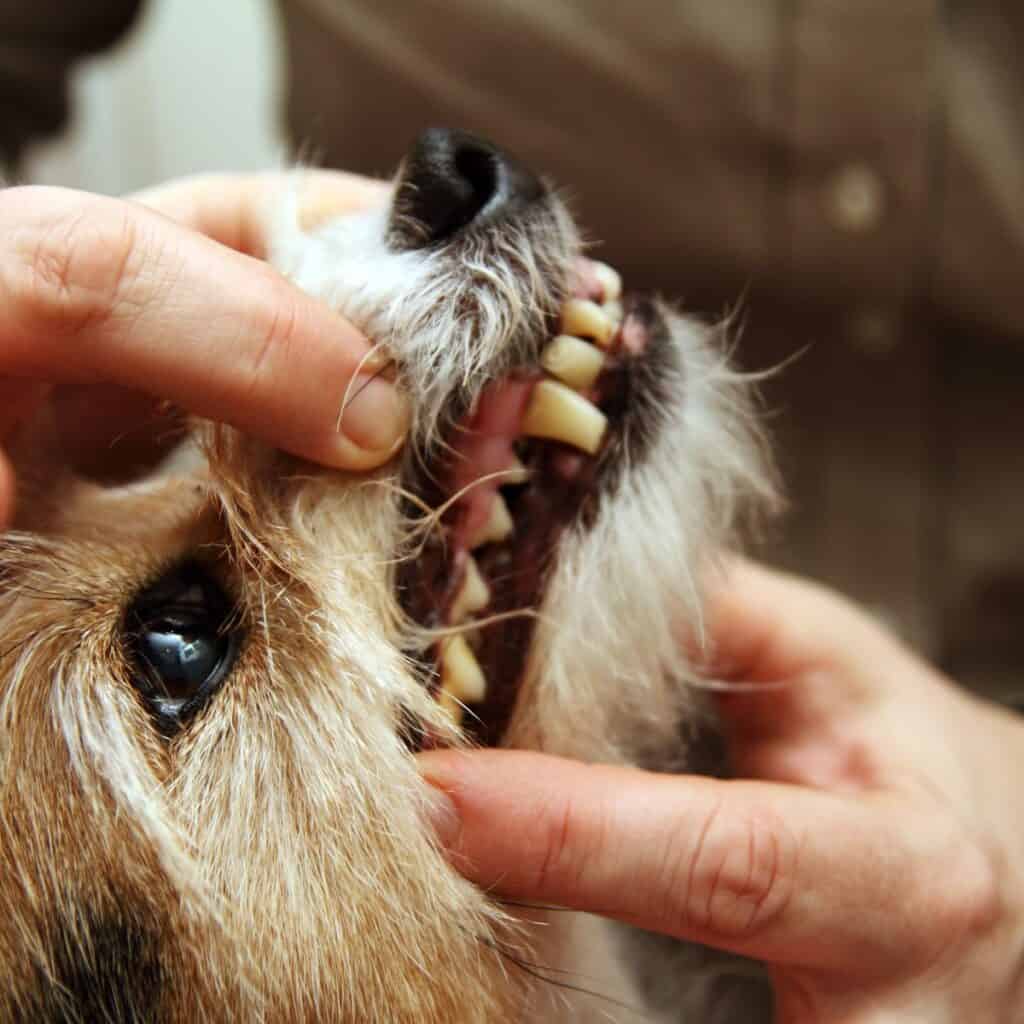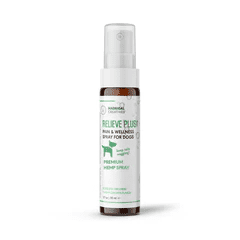A dog toothache is one of the top sources of chronic pain in dogs. If your dog is experiencing a dog toothache then they are also experiencing chronic pain and you need to address the issue immediately for the betterment and comfort of your dog.

You are not alone in having to face this issue, according to the American Veterinary Dental Association, over 80% of dogs have signs of dental disease by the time they reach 3 years of age and dental health is a very important part of your pet’s overall health, especially in senior dogs which seem to be affected by more dental issues that impact the quality of their lives, like a dog toothache.
What are the Causes of a Dog Toothache?
The most common cause of dog toothache is periodontal disease in addition dogs can have many of the same dental problems that people can develop that cause a dog toothache including:
- Broken teeth and roots
- Periodontal disease
- Abscesses or infected teeth
- Cysts or tumors in the mouth
Periodontal disease doesn’t just affect your pet’s mouth. Other health problems associated with periodontal disease include kidney, liver, and heart muscle changes as we discuss in our article about senior dog dental care found here.

According to the American Veterinary Dental Association, although cavities are less common in pets than in people the above issues are most typically the cause of a dog toothache.
What are the Signs of a Dog Toothache?
Many times our dogs our stoic creatures and do not show signs of pain, however, any of the following can be signs of a dog toothache.
- Bad breath (worse than usual)
- Broken or loose teeth
- Otherwise unexplained behavior changes
- Abnormal chewing, drooling or dropping food from the mouth
- Reduced appetite or refusal to eat even favorite foods
- Pain in or around the mouth
- Bleeding from the mouth
- Swelling in the areas surrounding the mouth
If these are not in fact the source of a dog toothache each issue in and of itself is a cause for a visit to the vet for a check-up.
What Do I Do if My Dog Has a Dog Toothache?
If your dog’s dental issues have raised to the level of a toothache then a visit to the vet is in order! Veterinary dental care is cleaning but also can be extraction and repair of teeth when your dog is under anesthesia.
First, your vet: will examine the pet’s entire mouth to look for any abnormalities in the teeth, gums, tongue, or other tissues and the source of the dog’s toothache
Radiographs (X-rays) may be needed to evaluate the health of the jaw bone and tooth roots below the gum line.
After that, your Vet will recommend a course of care for your dog which may include tooth repair or tooth extraction, or both which will be done under anesthesia. Many dog lovers of senior dogs may be concerned with the use of anesthesia on their senior dog, which should be discussed with your vet since each senior dog is different. Just because your dog is senior dental care and anesthesia should not be ruled out.
In the meantime, you will want to keep your dog comfortable and happy as we all know that chronic or acute pain from a dog toothache is pervasive and can affect your dog’s quality of life.

There are some interim measures that will reduce the pain. In my dogs (and even my kids! And myself) I spray Relieve Plus hemp spray directly on the affected area, I even had a dental procedure yesterday and post-procedure sprayed relief plus on the affected area and had significant relief.
Interim Measures to Support Dogs With Dog Toothache:
- Relieve Plus Hemp Spray spray directly on the affected area (See related How to Use CBD for Improved Dog Health)
- Soft Foods, particularly those that fight inflammation
- Follow tips and care for dogs with few teeth in our article here

Helping and supporting our dogs when they experience pain like pain from a dog toothache is our highest calling as dog lovers.
Hopefully, some of these tips to manage a dog toothache can help you do that. In the end, preventive tooth care is the most effective. We discuss an interesting study on the most effective ways to clean dogs’ teeth, the primary way to achieve preventative care, here.
Dog Toothache FAQs
Similar to people, the root cause of the tooth pain will eventually have to be dealt with if your dog has tooth pain. You do not want it to develop into a dog chronic pain issue. In the interim, natural products like Relieve Plus CBD hemp spray may support your dog.
There are many things that may help dogs, cloves in moderation, CBD from hemp Relieve Plus contains CBD and Boswellia, turmeric or ginger which is helpful for tooth pain.
Many NSAIDs, which Tylenol, aspirin and ibuprofen are considered safe for people can be toxic or even fatal for dogs. Even though you want to ease your dog’s pain do not give your dog aspirin, ibuprofen (Advil), acetaminophen (Tylenol), or any other medication designed for humans without first consulting your vet.
Looking to learn more about taking charge of your Dog’s Health? Learn about Pet Testing from The Popular Pets. Now offering pet testing for your the health of your pet and your peace of mind. Learn more about pet testing options.
You may also be interested in the Ultimate Guide to Heartworm
Diatomaceous Earth for Dogs and Cats FAQ
Diatomaceous earth is great for dogs and is safe to ingest and put on their skin, sniffing diatomaceous earth is not a problem but dog owners do need to be careful that dogs do not inhale DE further. The silica in DE can be harmful to dog and cat lungs, especially pets with respiratory issues. The many benefits of DE make it a useful pet wellness tool.
Since DE is an excellent addition to food due to its ability to kill parasites, bind collagen and support a healthy coat and joints, licking DE is not only beneficial but suggested. DE is safe for dogs but dog lovers should get food grade DE to be safe.
Diatomaceous earth will not harm dogs. DE is non-toxic and actually helpful for dogs due to its many wellness attributes. Pet lovers have found many benefits to adding DE to their pet’s food to help support a healthy coat and fend off parasites and on externally to help with fleas and ticks.

